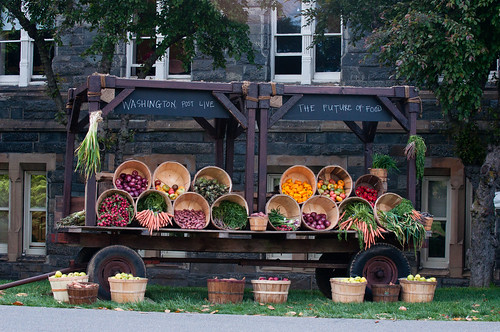
Washington Post sponsored the Future of Food conference, a photo by Georgetown Voice Photos on Flickr.
On May 4, Washington Post Live held a conference on The Future of Food at Georgetown University. Thanks to the power of the interwebs, I was able to stream most of the conference from home and ended up doing my first live-tweet of anything (yay for that warm fuzzy electronic community feeling). But since that was mostly just quoting things people said, I wanted to blather on and on, I mean delve a little further, into what I took away from the event here and in some future posts.
I thought Prince Charles’s speech was excellent, in that it was very comprehensive, highlighting the interconnected webbiness that makes up the food system and why it’s imperative to consider that creating a truly sustainable system. The speech and the conference overall showed how food is not monolithic, and that it is in fact “part of a wider socioeconomic landscape.” What’s going on in one part of the system will have real impacts elsewhere. And for food that means the current system has real impacts on climate change and the health of the environment and people. So some of the solutions that Prince Charles presented are large and complex but important to consider, with calls to deepen our understanding between food, energy, water and economic security; taking steps with the whole system in mind, which means we must value and support local communities; and consider agriculture as an entire culture, not solely as an industry.
That distinction of agri-culture vs. agri-industry falls into that familiar divide between feeeeelings versus cold hard calculations, the messy complexities of cultures versus the orderly business of numbers, all so often treated as though never the twain shall or should meet. It’s easy to speak about food as industry, business, markets…. advocacy within these lines means voting with one’s wallet—change through affecting consumer demand and business practices. That approach is significant in some ways, but individual wallets can only tilt the balance so much and address a few threads of the web that is largely woven by the big wallets. (Great, now I’m imagining a weird wallet-spider evil-leggy thing selling sugary things.) In regards to industrial vs organic agriculture, Sec. Vilsack’s declaration to let the market decide, let consumers choose, made me shake my head. Lack of public information and transparency in the food system, amongst other things, means that consumers often have no such choice and they'll be caught by the scary wallet-spider thing.
A question that kept coming up was what the role of government was and that didn’t really get explored as fully as I would’ve liked to hear, both in terms of its interplay and tension with business as well as how this food movement can better harness its power. Legislation and policy certainly affect the food system, but how do we influence those aspects? Ronald Shaich of Panera Bread characterized government as equal to the public (“We make determinations of what kind of society we want to live in . . . through our government.”), but I think Marion Nestle was more on the money with her (sort of?) joke that maybe what the food movement should be doing is buying their own Congresspeople. But at heart, her solution for change involved government, getting Congress to make such changes and fix the way corporations are evaluated.
Gary Hirshberg, CEO of Stonyfield Farms, pointed out that we’ve got the science on the productivity of organic yields but we don’t have the political power or voice. I think that’s true of a lot of aspects of the food system — we have evidence of harms to farmworkers, of food insecurity in low-income communities, of increasing diet-related diseases, of the economic troubles of small and family farmers — but there’s little political power or voice. I liked the California Endowment’s Robert Ross’s point that the only way to confront issues of power is to craft a movement that wields power, but of course the tough question is how we make that happen. Patrick Holden, director of the Sustainable Food Trust, exhorted that it was past the time for taking comfort in being adversarial, calling for working with others to rebuild the food system.
Ross quoted a great tidbit of Moms Mabley's — "If you always do what you have always did, you will always get what you have always got." — something to keep in mind as we get over that adversarial comfort and roll up some sleeves. Panelists like Fedele Bauccio of Bon Appétit Management Company saw hope in young people today driving change, and Marion Nestle urged on the rapid growth of the food movement (we need a better, catchier name?). Young people are itching to really play that part in this movement, but questions about getting more involved often get something of a short shrift in response — to volunteer somewhere, to buy local, join a community garden … basically the stuff that’s already happening. I think getting more involved means aiming for more meaningful and systemic change, being able to wield more power. Maybe that means working to get into positions of power within the current system, or becoming innovative and knowledgeable enough to create new systems, or helping scale up projects that are working, or being loud enough to raise up communities and express that political voice.
More blathering blotherings later!
And here are some links:
- Tim Carman's report (Love that he uncovered quotes about climate change, that didn't really get addressed in the conference outside of Prince Charles's speech. Favorite image - "global climate change hangs over our heads like the blade of a guillotine.")
- Link to Washington Post Live page, with video clips, agenda, more info
- Excerpts/quotes from conference

No comments:
Post a Comment